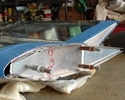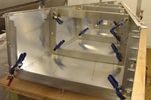


random user submitted photo
Sonex Flight Safety
2 posts
• Page 1 of 1
Sonex Flight Safety
Here is an interesting and informative message from the FAA that I wanted to share with the Sonex pilot community:
Surviving the Unexpected
Notice Number: NOTC6122
How do you prepare for an event when you don’t know what the event is, or when it will come? That’s a tough one, so let’s try something a little easier. How do you prepare for an event when you know what it is, but you don’t know when it will come? We actually do it all the time. (There is even a name for these two groups of events – the known unknowns and the unknown unknowns.)
All pilots, probably by lesson number three or four, start hearing about things that can go wrong during their flying lives, and how they should properly and safely react . Some of these events are irritants, but some are true emergencies. (And sometimes the difference depends on the pilot or the timing of the event.)
We learn how to react to engines that quit at various points in flight; we learn how to react to smoke in the cabin; we learn how to react when the radios stop working. Many of these events never occur, but we practice and talk about them anyway. The common factor in all of these situations is that we never know when they will occur. So, how do you stay ready? Here are some ideas:
• Read about how other pilots reacted to these situations, and how successful they were in dealing with them. For example, every flying magazine that crosses my desk has one or more columns dealing with the unexpected. In the last couple of months I have read about the effects of fuel starvation, TFR incursions, a forced landing in a parking lot, and icing, just to name a few. In some cases, the articles and columns describe a successful conclusion. Other times, an unsuccessful conclusion. But there are lessons in all.
• Another idea is to join some type of pilot community where you can talk to other pilots about their experiences. Some of the more obvious are local EAA Chapters, local IMC clubs, or state flying organizations. But, there is another possibility as well. Flying clubs have long been a great way to share the expense of owning an aircraft. But suppose for any number of reasons that you really don’t want to share ownership a plane with others. Find a local club and ask if they have regular meetings and whether you can join in just to chat. Most will say yes.
• Finally, look around for a flight instructor and ask to go fly for an hour or so and work on things that you don’t normally do. And although you may like your regular CFI, step out of the box and find someone new with techniques and thoughts that you might not have previously considered. Here are some sites to get you started in your search for a highly qualified CFI:
http://www.nafinet.org/member_directory.aspx
http://www.masterinstructors.org/resour ... nstructor/
For Beechcraft pilots: http://www.bonanza.org/pilot-training-b ... irect=true
Coming back to the original question: How do you prepare for an event when you don’t even know what the event might be? Two examples come to mind. One is recent and involves an unexpected passenger with a potential to cause significant damage. (www.youtube.com/watch?v=sT7LaSbkpcg). The other example involves an aircraft at the other end of the size and complexity spectrum, and how the crew dealt with the loss of one engine and all flight controls. (en.wikipedia.org/wiki/United_Airlines_Flight_232)
In both cases, the pilots were faced with situations that they had never thought about. However, they discovered that their training for other emergencies helped form a basis for successfully dealing with the unexpected situation.
Fly safe, have fun.
Christopher Hope
2015 FAASTeam Representative of the Year
To contact the author, go to: www.ChrisHopeFAAFlightInstructor.com
For more information on the GA Awards program go to www.generalaviationawards.org/
Surviving the Unexpected
Notice Number: NOTC6122
How do you prepare for an event when you don’t know what the event is, or when it will come? That’s a tough one, so let’s try something a little easier. How do you prepare for an event when you know what it is, but you don’t know when it will come? We actually do it all the time. (There is even a name for these two groups of events – the known unknowns and the unknown unknowns.)
All pilots, probably by lesson number three or four, start hearing about things that can go wrong during their flying lives, and how they should properly and safely react . Some of these events are irritants, but some are true emergencies. (And sometimes the difference depends on the pilot or the timing of the event.)
We learn how to react to engines that quit at various points in flight; we learn how to react to smoke in the cabin; we learn how to react when the radios stop working. Many of these events never occur, but we practice and talk about them anyway. The common factor in all of these situations is that we never know when they will occur. So, how do you stay ready? Here are some ideas:
• Read about how other pilots reacted to these situations, and how successful they were in dealing with them. For example, every flying magazine that crosses my desk has one or more columns dealing with the unexpected. In the last couple of months I have read about the effects of fuel starvation, TFR incursions, a forced landing in a parking lot, and icing, just to name a few. In some cases, the articles and columns describe a successful conclusion. Other times, an unsuccessful conclusion. But there are lessons in all.
• Another idea is to join some type of pilot community where you can talk to other pilots about their experiences. Some of the more obvious are local EAA Chapters, local IMC clubs, or state flying organizations. But, there is another possibility as well. Flying clubs have long been a great way to share the expense of owning an aircraft. But suppose for any number of reasons that you really don’t want to share ownership a plane with others. Find a local club and ask if they have regular meetings and whether you can join in just to chat. Most will say yes.
• Finally, look around for a flight instructor and ask to go fly for an hour or so and work on things that you don’t normally do. And although you may like your regular CFI, step out of the box and find someone new with techniques and thoughts that you might not have previously considered. Here are some sites to get you started in your search for a highly qualified CFI:
http://www.nafinet.org/member_directory.aspx
http://www.masterinstructors.org/resour ... nstructor/
For Beechcraft pilots: http://www.bonanza.org/pilot-training-b ... irect=true
Coming back to the original question: How do you prepare for an event when you don’t even know what the event might be? Two examples come to mind. One is recent and involves an unexpected passenger with a potential to cause significant damage. (www.youtube.com/watch?v=sT7LaSbkpcg). The other example involves an aircraft at the other end of the size and complexity spectrum, and how the crew dealt with the loss of one engine and all flight controls. (en.wikipedia.org/wiki/United_Airlines_Flight_232)
In both cases, the pilots were faced with situations that they had never thought about. However, they discovered that their training for other emergencies helped form a basis for successfully dealing with the unexpected situation.
Fly safe, have fun.
Christopher Hope
2015 FAASTeam Representative of the Year
To contact the author, go to: www.ChrisHopeFAAFlightInstructor.com
For more information on the GA Awards program go to www.generalaviationawards.org/
Sonex Tri Gear, Rotax 912 ULS, Sensenich 3 Blade Ground Adjustable Propeller
MGL Velocity EMS, Garmin GTR 200 Comm, GTX 335 ADS B Out Transponder
ILevil AW AHRS & ADS-B In, UAvionix AV20S
200+ hours previously with Aerovee engine
Sarasota, Florida
MGL Velocity EMS, Garmin GTR 200 Comm, GTX 335 ADS B Out Transponder
ILevil AW AHRS & ADS-B In, UAvionix AV20S
200+ hours previously with Aerovee engine
Sarasota, Florida
-

SonexN76ET - Posts: 490
- Joined: Tue Aug 27, 2013 2:39 pm
- Location: Atlanta
Re: Sonex Flight Safety
Good stuff! We should always be learning and always be thinking.
Be safe!
Be safe!
Joe Norris
Sonex N208GD (S/N 450)
Sonerai II N13NN (S/N 1206)
Fortes Fortuna Adiuvat
Sonex N208GD (S/N 450)
Sonerai II N13NN (S/N 1206)
Fortes Fortuna Adiuvat
-

Sonerai13 - Posts: 413
- Joined: Tue Nov 05, 2013 5:36 pm
- Location: Oshkosh, WI
2 posts
• Page 1 of 1
Who is online
Users browsing this forum: Google [Bot] and 36 guests







